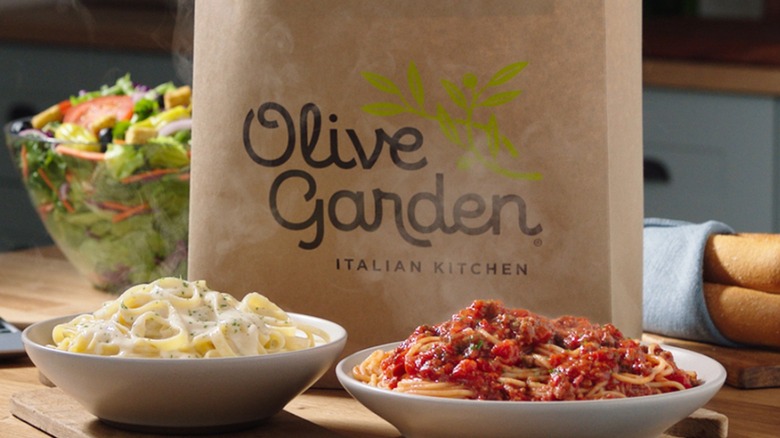Here's What Olive Garden Does With All The Extra Food It Doesn't Serve
Our favorite Italian dishes at Olive Garden are delicious, family-friendly fare that we've been enjoying since 1982 — to wit, a '90s-era Olive Garden menu gave us crazy nostalgia — and we're pretty sure that, over our lifetimes, we've eaten our weight in unlimited soup, salad, and breadsticks alone. Of all the Olive Garden restaurant secrets you may not have known (like the fact that there's an unofficial secret menu!), the fact that Darden, parent company of the O.G., donates a huge amount of uneaten food every year is one that will put a smile on your face.
Since 2003, Darden's Harvest Program has donated some 146 million pounds of food from its multiple restaurant chains, which include Longhorn Steakhouse, Cheddar's Scratch Kitchen, Chuy's, and, of course, Olive Garden. Darden works with Feeding America and the Food Donation Connection (FDC) to get unused food to local charities that can distribute it to people struggling with food insecurity. This is all food that was meant to be dished up but never was. Restaurant employees bag, weigh, and label the donations, which are picked up and distributed to nonprofit organizations working with hungry citizens.
Darden, for its part, also maintains a fleet of about 50 refrigerated trucks to help dispatch donations more efficiently. The organizations that are recipients of the food can serve it to individuals as is or use the food to transform it into other meals that perhaps are better-rounded for serving a large number of people. If you know how long cooked pasta lasts in the fridge, you know that unutilized food can have a long second life feeding needy Americans.
Food waste is a solvable problem in the restaurant industry
The Food Waste Reduction Alliance estimates that a full 25 to 40% of food that is grown, processed, and shipped in America won't ever be eaten. A whopping 66 billion pounds of leftover food waste are generated by the domestic restaurant industry annually, with an individual restaurant capable of producing as much as 75,000 pounds of food waste every year. In 2023, the USDA Economic Research Service determined that 13.5% of American households experienced either low or very low food security, which amounted to tens of millions of people having to worry about their next meal. Clearly, there's an imbalance at work here: restaurants are wasting almost unfathomable amounts of food, much of which is edible, while a significant number of people don't have enough to eat.
Restaurants have more than a moral impetus to cut back on food waste — when companies like Darden donate meals, they receive tax write-offs that can benefit their bottom line. The National Restaurant Association has urged food service companies to work with organizations like The Food Waste Reduction Alliance and ReFED and to make gradual, sustainable changes that aren't a pain to implement but, when added together, all amount to a big difference in the lives of the hungry in their communities.
Companies like Darden also benefit from combatting food waste by feeding the food insecure because it pays off in public goodwill. Nobody likes the idea of perfectly fine food going to waste, and programs that connect leftover food with hungry consumers instead of trash bins generate positive publicity. Ultimately, everyone wins when initiatives like Darden/Olive Garden's Harvest Program are brought to fruition.

